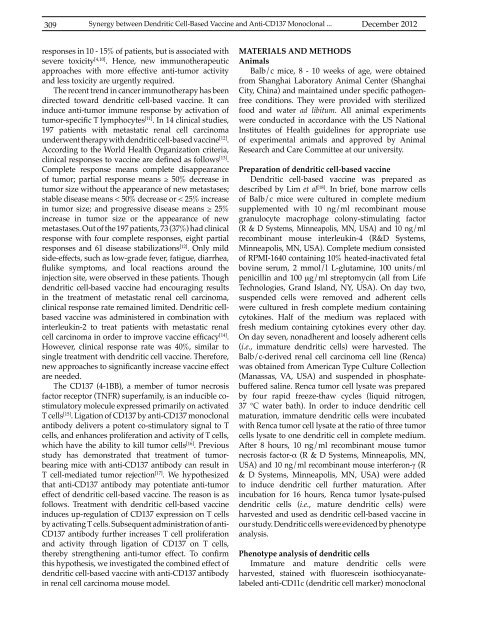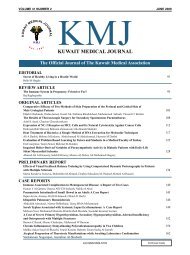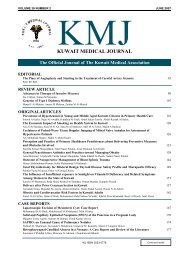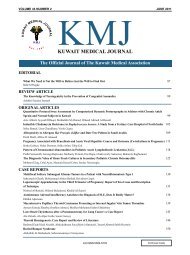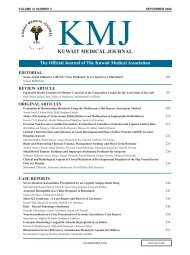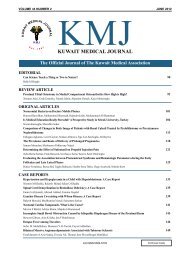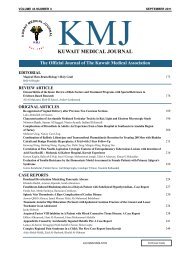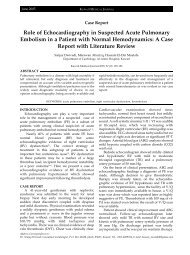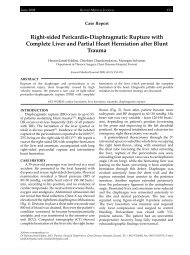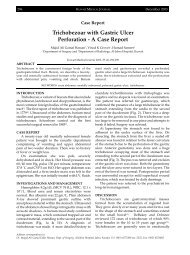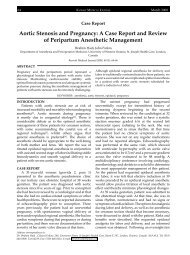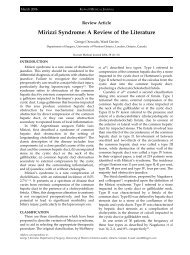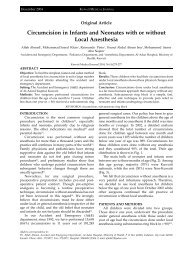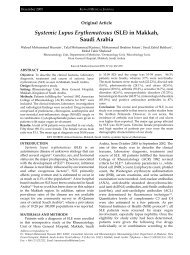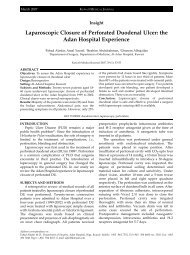Vol 44 # 4 December 2012 - Kma.org.kw
Vol 44 # 4 December 2012 - Kma.org.kw
Vol 44 # 4 December 2012 - Kma.org.kw
Create successful ePaper yourself
Turn your PDF publications into a flip-book with our unique Google optimized e-Paper software.
309<br />
Synergy between Dendritic Cell-Based Vaccine and Anti-CD137 Monoclonal ...<br />
<strong>December</strong> <strong>2012</strong><br />
responses in 10 - 15% of patients, but is associated with<br />
severe toxicity [4,10] . Hence, new immunotherapeutic<br />
approaches with more effective anti-tumor activity<br />
and less toxicity are urgently required.<br />
The recent trend in cancer immunotherapy has been<br />
directed toward dendritic cell-based vaccine. It can<br />
induce anti-tumor immune response by activation of<br />
tumor-specific T lymphocytes [11] . In 14 clinical studies,<br />
197 patients with metastatic renal cell carcinoma<br />
underwent therapy with dendritic cell-based vaccine [12] .<br />
According to the World Health Organization criteria,<br />
clinical responses to vaccine are defined as follows [13] .<br />
Complete response means complete disappearance<br />
of tumor; partial response means ≥ 50% decrease in<br />
tumor size without the appearance of new metastases;<br />
stable disease means < 50% decrease or < 25% increase<br />
in tumor size; and progressive disease means ≥ 25%<br />
increase in tumor size or the appearance of new<br />
metastases. Out of the 197 patients, 73 (37%) had clinical<br />
response with four complete responses, eight partial<br />
responses and 61 disease stabilizations [12] . Only mild<br />
side-effects, such as low-grade fever, fatigue, diarrhea,<br />
flulike symptoms, and local reactions around the<br />
injection site, were observed in these patients. Though<br />
dendritic cell-based vaccine had encouraging results<br />
in the treatment of metastatic renal cell carcinoma,<br />
clinical response rate remained limited. Dendritic cellbased<br />
vaccine was administered in combination with<br />
interleukin-2 to treat patients with metastatic renal<br />
cell carcinoma in order to improve vaccine efficacy [14] .<br />
However, clinical response rate was 40%, similar to<br />
single treatment with dendritic cell vaccine. Therefore,<br />
new approaches to significantly increase vaccine effect<br />
are needed.<br />
The CD137 (4-1BB), a member of tumor necrosis<br />
factor receptor (TNFR) superfamily, is an inducible costimulatory<br />
molecule expressed primarily on activated<br />
T cells [15] . Ligation of CD137 by anti-CD137 monoclonal<br />
antibody delivers a potent co-stimulatory signal to T<br />
cells, and enhances proliferation and activity of T cells,<br />
which have the ability to kill tumor cells [16] . Previous<br />
study has demonstrated that treatment of tumorbearing<br />
mice with anti-CD137 antibody can result in<br />
T cell-mediated tumor rejection [17] . We hypothesized<br />
that anti-CD137 antibody may potentiate anti-tumor<br />
effect of dendritic cell-based vaccine. The reason is as<br />
follows. Treatment with dendritic cell-based vaccine<br />
induces up-regulation of CD137 expression on T cells<br />
by activating T cells. Subsequent administration of anti-<br />
CD137 antibody further increases T cell proliferation<br />
and activity through ligation of CD137 on T cells,<br />
thereby strengthening anti-tumor effect. To confirm<br />
this hypothesis, we investigated the combined effect of<br />
dendritic cell-based vaccine with anti-CD137 antibody<br />
in renal cell carcinoma mouse model.<br />
MATERIALS AND METHODS<br />
Animals<br />
Balb/c mice, 8 - 10 weeks of age, were obtained<br />
from Shanghai Laboratory Animal Center (Shanghai<br />
City, China) and maintained under specific pathogenfree<br />
conditions. They were provided with sterilized<br />
food and water ad libitum. All animal experiments<br />
were conducted in accordance with the US National<br />
Institutes of Health guidelines for appropriate use<br />
of experimental animals and approved by Animal<br />
Research and Care Committee at our university.<br />
Preparation of dendritic cell-based vaccine<br />
Dendritic cell-based vaccine was prepared as<br />
described by Lim et al [18] . In brief, bone marrow cells<br />
of Balb/c mice were cultured in complete medium<br />
supplemented with 10 ng/ml recombinant mouse<br />
granulocyte macrophage colony-stimulating factor<br />
(R & D Systems, Minneapolis, MN, USA) and 10 ng/ml<br />
recombinant mouse interleukin-4 (R&D Systems,<br />
Minneapolis, MN, USA). Complete medium consisted<br />
of RPMI-1640 containing 10% heated-inactivated fetal<br />
bovine serum, 2 mmol/l L-glutamine, 100 units/ml<br />
penicillin and 100 μg/ml streptomycin (all from Life<br />
Technologies, Grand Island, NY, USA). On day two,<br />
suspended cells were removed and adherent cells<br />
were cultured in fresh complete medium containing<br />
cytokines. Half of the medium was replaced with<br />
fresh medium containing cytokines every other day.<br />
On day seven, nonadherent and loosely adherent cells<br />
(i.e., immature dendritic cells) were harvested. The<br />
Balb/c-derived renal cell carcinoma cell line (Renca)<br />
was obtained from American Type Culture Collection<br />
(Manassas, VA, USA) and suspended in phosphatebuffered<br />
saline. Renca tumor cell lysate was prepared<br />
by four rapid freeze-thaw cycles (liquid nitrogen,<br />
37 °C water bath). In order to induce dendritic cell<br />
maturation, immature dendritic cells were incubated<br />
with Renca tumor cell lysate at the ratio of three tumor<br />
cells lysate to one dendritic cell in complete medium.<br />
After 8 hours, 10 ng/ml recombinant mouse tumor<br />
necrosis factor-α (R & D Systems, Minneapolis, MN,<br />
USA) and 10 ng/ml recombinant mouse interferon-γ (R<br />
& D Systems, Minneapolis, MN, USA) were added<br />
to induce dendritic cell further maturation. After<br />
incubation for 16 hours, Renca tumor lysate-pulsed<br />
dendritic cells (i.e., mature dendritic cells) were<br />
harvested and used as dendritic cell-based vaccine in<br />
our study. Dendritic cells were evidenced by phenotype<br />
analysis.<br />
Phenotype analysis of dendritic cells<br />
Immature and mature dendritic cells were<br />
harvested, stained with fluorescein isothiocyanatelabeled<br />
anti-CD11c (dendritic cell marker) monoclonal


